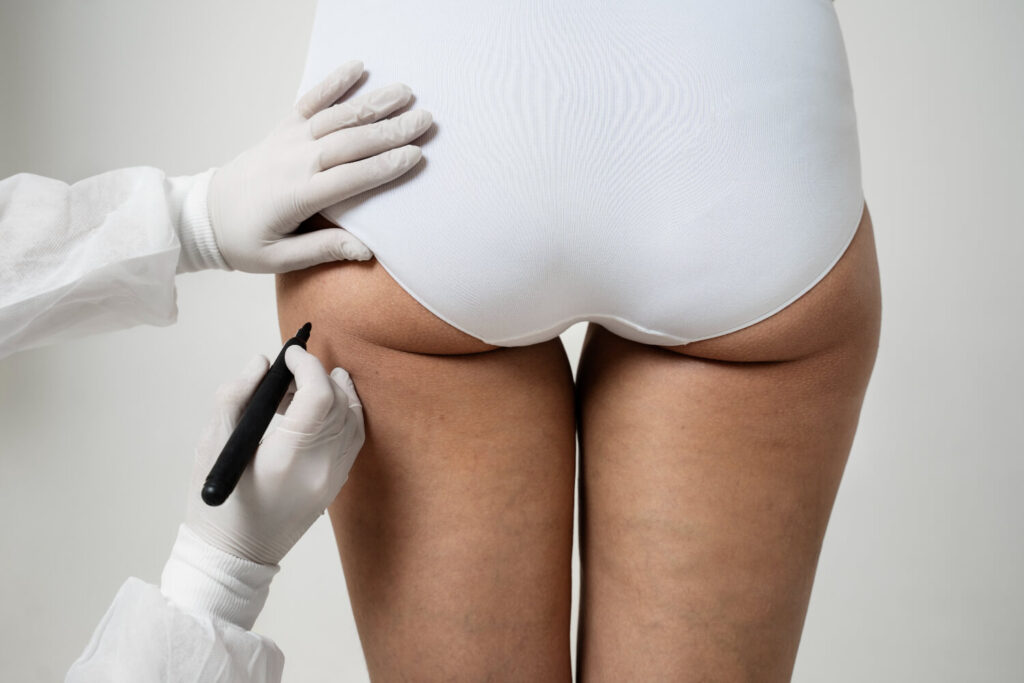The question of what happens after losing weight following a BBL comes up often for those who have undergone the procedure. It can feel confusing to understand how the body reacts to weight changes, especially regarding the volume and shape of the buttocks. For anyone concerned about their BBL results, the impact of weight loss becomes an important topic.
Asking, “Will I lose my BBL if I lose weight?” makes perfect sense because every body responds differently. The possibility of changes in the buttocks’ volume leaves many people worried about losing the results they worked so hard to achieve.
In the sections ahead, this article explains how the body responds to weight after a BBL, what to expect regarding changes in the shape of the buttocks, and how to maintain your results for as long as possible.
How does weight loss affect a bbl?
Weight loss impacts different areas of the body in various ways, depending on how the body stores and loses fat. In a BBL, fat is harvested from donor areas, such as the abdomen or thighs, and transferred to the buttocks. The key question is whether losing weight will cause the transferred fat to shrink or change shape.
Fat cells in the buttocks can respond to weight fluctuations, including those added during a BBL. If overall weight decreases, it’s likely some fat volume in the buttocks reduces as well. However, the extent depends on how much weight is lost and how the body distributes fat.
What happens to transferred fat during weight loss?
Transferred fat acts similarly to the fat in its original location. If someone loses weight, the fat cells that were moved to the buttocks can also shrink. This process doesn’t mean losing all the results of the BBL, but it may lead to subtle changes in size or shape.
Factors like genetics, metabolism, and the amount of fat transferred during the surgery influence how the body responds to weight loss. For individuals who lose a small amount of weight, the buttocks may retain most of their shape and volume. However, significant weight loss might result in noticeable differences.
How much weight loss impacts bbl results?
Small fluctuations in weight, such as 10-15 pounds, generally don’t cause drastic changes in BBL results. On the other hand, larger weight losses, such as 30 pounds or more, could alter the appearance. The buttocks may become less voluminous if the transferred fat cells shrink significantly.
People who plan to lose a significant amount of weight after a BBL may experience different outcomes than those who maintain a stable weight. Discussing weight management with a surgeon before the procedure can provide clearer expectations.
Ways to maintain weight after a BBL
- Healthy diet: Eating nutrient-rich foods supports overall body health and can help maintain stable weight.
- Hydration: Drinking enough water daily supports metabolism and helps avoid overeating.
- Regular exercise: Engaging in a balanced fitness routine, including cardio and strength training, promotes long-term weight stability.
- Follow-up with your surgeon: Periodic consultations ensure your results remain aligned with your goals.
What if weight gain occurs instead?
Increased weight can enlarge the fat cells in the buttocks, potentially enhancing volume but altering proportions. Keeping weight stable prevents unwanted changes, whether gaining or losing.
When to consider a touch-up procedure
Significant weight changes after a BBL may lead to dissatisfaction with the results. In these cases, some individuals opt for a touch-up procedure to restore volume or symmetry.
Touch-ups typically involve transferring more fat to areas of concern. Consulting with an experienced plastic surgeon can clarify if this option aligns with your goals.
What to discuss with your surgeon
Before undergoing a BBL, discussing weight goals with your surgeon ensures personalized recommendations. Some topics to address include:
- Your ideal weight before and after surgery.
- How much fat will be transferred and the expected volume.
- Strategies to maintain results long-term.
These conversations provide clarity and help align your expectations with the reality of weight fluctuations.
Frequently asked questions about bbl and weight loss
1. Will cardio workouts shrink my bbl fat?
While cardio contributes to overall fat loss, it doesn’t specifically target the fat in the buttocks. Incorporating moderate cardio alongside a healthy diet helps maintain weight without drastically altering BBL results.
2. Can weight loss cause asymmetry after a bbl?
Significant weight loss has the potential to create uneven fat distribution, leading to asymmetry in the buttocks. This issue may require correction through a touch-up procedure.
3. How soon after surgery can I lose weight?
Surgeons often recommend stabilizing your weight before attempting any weight loss after a BBL. Waiting several months allows the transferred fat to settle fully.
4. Will I lose my bbl if I lose weight too fast?
Rapid weight loss increases the likelihood of compromising your BBL results. Gradual weight loss provides the best chance of retaining the shape and volume achieved through the surgery.



